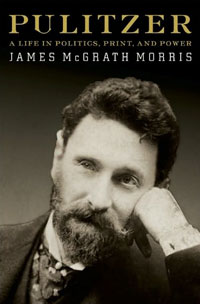No Eyes on the Prize

There are some people who believe Alfred Nobel and Joseph Pulitzer are better known for the prizes that bear their names than their places in history. Such an optimistic claim is at the least arguable especially now that there are so many awards that even the bad is celebrated—bad sex, bad prose, bad fashion—and fame and infamy seem interchangeable.
But that doesn’t restrain James McGrath Morris and the publisher of his prodigious biography, Pulitzer: A Life in Politics, Print, and Power (Harper Collins). Of course, one could also speculate on what happens when the day comes that print journalism becomes an anachronism? But that is another story, isn’t it?
A Hungarian Jewish immigrant, Joseph Pulitzer’s (1847-1911) story is one of the rags-to-riches tales that contribute to a fundament of the American creed—that this is a land of opportunity. In Pulitzer’s case, his ascension during America’s Gilded Age, otherwise known as the (first) age of the robber barons, made him sensitive to the effects of industrialization and industrial consolidation (also known as monopolies or trusts), and led to his pioneering efforts in establishing the centrality of the daily newspaper (the St. LouisPost-Dispatch) in modern American urban life. And difficult as it may be to imagine (given the vision of today’s media oligarchs), Pulitzer was a progressive given to promoting a populist agenda. Interestingly, he ran afoul of Theodore Roosevelt, who pursued having him jailed.
Morris contends that:
Pulitzer’s lasting achievement was to transform American journalism into a medium of mass consumption and mass influence… This accomplishment alone would make him worthy of a biography.
His fascinating life, however, makes him an irresistible subject:
Ted Turner-like in his innovative abilities, Teddy Roosevelt-like in his history-transforming power, and Howard Hughes-like in his reclusive second half of his life as a blind man tormented by sound, Pulitzer’s tale provides all the elements of a life story that is important, timely, and compelling.
For those of you with historiographical concerns, Morris’s biography, the first of Joseph Pulitzer in 40 years, does benefit from new sources—among them Pulitzer’s brother’s unpublished memoir and a box of discarded papers that were preserved and ignored until 2008.
Also, consider the epigram quoting Pulitzer that precedes the book’s text:
Hmmm.
